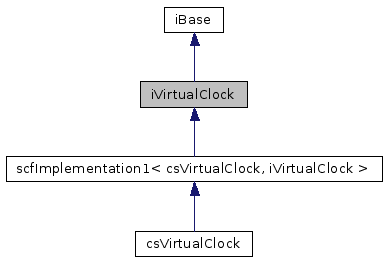iVirtualClock Struct Reference
A virtual game clock. More...
#include <iutil/virtclk.h>
Inheritance diagram for iVirtualClock:

Public Member Functions | |
| virtual void | Advance ()=0 |
| Advance the engine's virtual-time clock. | |
| virtual csTicks | GetCurrentTicks () const =0 |
| Returns the absolute time of the last call to Advance(). | |
| virtual csTicks | GetElapsedTicks () const =0 |
| Query the time elapsed between the two most recent invocations of Advance(). | |
| virtual void | Resume ()=0 |
| Resume the engine's virtual-time clock. | |
| virtual void | Suspend ()=0 |
| Suspend the engine's virtual-time clock. | |
Detailed Description
A virtual game clock.Normally, a single instance of iVirtualClock is placed in the shared object registry (iObjectRegistry).
Main creators of instances implementing this interface:
Main ways to get pointers to this interface:
Definition at line 38 of file virtclk.h.
Member Function Documentation
| virtual void iVirtualClock::Advance | ( | ) | [pure virtual] |
| virtual csTicks iVirtualClock::GetCurrentTicks | ( | ) | const [pure virtual] |
Returns the absolute time of the last call to Advance().
For game logic you should always use this function instead of csGetTicks().
Implemented in csVirtualClock.
| virtual csTicks iVirtualClock::GetElapsedTicks | ( | ) | const [pure virtual] |
Query the time elapsed between the two most recent invocations of Advance().
Implemented in csVirtualClock.
| virtual void iVirtualClock::Resume | ( | ) | [pure virtual] |
Resume the engine's virtual-time clock.
Call this function when the client application begins invoking Advance() again after extended down-time. This function is the complement of Suspend().
Implemented in csVirtualClock.
| virtual void iVirtualClock::Suspend | ( | ) | [pure virtual] |
Suspend the engine's virtual-time clock.
Call this function when the client application will fail to call Advance() for an extended period of time. Suspending the virtual-time clock prevents a temporal anomaly from occurring the next time GetElapsedTicks() is called after the application resumes invoking Advance().
Implemented in csVirtualClock.
The documentation for this struct was generated from the following file:
- iutil/virtclk.h
Generated for Crystal Space by doxygen 1.4.7
